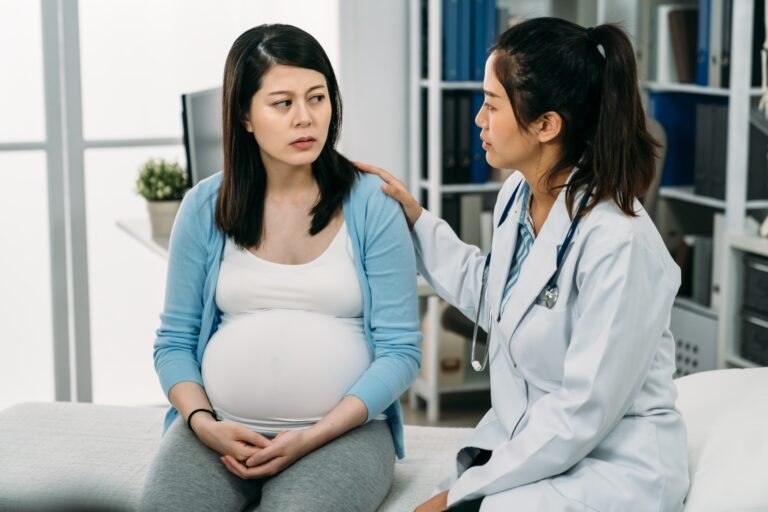Preeclampsia is a complication of pregnancy characterized by high blood pressure and abnormalities in liver and kidney function. Preeclampsia occurs in approximately 5-8% of pregnancies and is a major cause of maternal and fetal morbidity and mortality. Risk factors for preeclampsia include preeclampsia during a previous pregnancy, first pregnancy, multiple pregnancy, maternal age over 40, obesity, and certain underlying medical conditions, such as chronic hypertension, diabetes, and kidney disease .
Exactly what causes preeclampsia is not fully understood. Because serotonin plays a role in vascular function and blood pressure regulation, some have questioned whether the use of serotonin reuptake inhibitor (SRI) antidepressants might affect a woman’s risk for preeclampsia. While several studies have shown an increased risk of preeclampsia in women taking SRIs during pregnancy, this finding is not consistent, and most of these studies were small and could not account for potential confounders.
A recent meta-analysis Including 400,000 women exposed to SSRIs showed a small, statistically significant association between prenatal exposure to SSRIs and risk of preeclampsia. However, the authors noted some important limitations of this meta-analysis. Most importantly, most of the studies included in the meta-analysis failed to account for the severity of anxiety/depression, SSRI dose, and/or other well-defined risk factors for preeclampsia (eg, obesity, diabetes, smoking, race). . The most common limitation of the included studies was the failure to account for the severity of maternal anxiety/depression, which may independently lead to risk for preeclampsia.
A closer look at SRIs and preeclampsia
It is biologically plausible that SRIs may actually reduce the risk for preeclampsia. Both depression and preeclampsia are associated with dysregulation of serotonergic neurotransmitter systems. Therefore, it is plausible that drugs, such as SRI antidepressants, that improve serotonergic regulation may also help reduce depressive symptoms, as well as reduce vulnerability to preeclampsia.
To further investigate this possibility, Vignato and colleagues evaluated clinical data from a retrospective study of 9558 SSRI-naïve and 9046 SSRI-treated pregnancies. Psychiatric diagnoses were determined using a review of medical records, and depressive symptoms were measured using the Patient Health Questionnaire-9 (PHQ-9). They observed that SSRI use during pregnancy was associated with a reduced risk of preeclampsia after controlling for clinical confounders, including severity of depression, history of chronic hypertension, diabetes, body mass index, and age (odds ratio, OR = 0.9 [95% CI 0.7-1.0]p = 0.05).
Going a step further, this study also looked at how depression and SSRI treatment might affect the risk for pre-eclampsia by looking at copeptin levels. Copeptin is a peptide co-secreted (in a 1:1 ratio) with arginine vasopressin (AVP) in response to hemodynamic or osmotic stimuli. In patients with preeclampsia, increased AVP secretion stimulates an increase in blood pressure. Copeptin is easier to measure than AVP and previous studies have shown this Copeptin levels are a reliable predictor of preeclampsia risk.
In a subset of 233 pregnancies, copeptin levels were measured in early pregnancy (< 20 weeks). Compared to women with mild or no depression, women with moderate to severe depressive symptoms produced significantly higher levels of copeptin (240 ± 29 vs. 142 ± 10 ng/mL, p < 0.001). SSRI treatment significantly reduced first-trimester copeptin levels (78 ± 22 in users vs. 240 ± 29 ng/ml in nonusers, p < 0.001).
Looking specifically women with moderate-to-severe depressive symptoms taking SSRIs, copeptin levels were significantly lower in SSRI-treated women than in untreated women with moderate-to-severe depressive symptoms (181?±?64 ng/mL [n?=?10] against 657?±?164 [n?=?10], Pi?=?0.02).
Clinical Implications
Based on the findings of this study, it is likely that SSRIs may actually reduce the risk of preeclampsia, while depressive symptoms, especially when more severe, may actually increase the risk of preeclampsia.
While future studies will help clarify the complex interplay between depression, SSRI therapy, and preeclampsia, the information we have so far is reassuring. If there is a risk of preeclampsia associated with SSRI therapy, the risk appears to be relatively small. However, there are substantial data indicating that the risk of preeclampsia is higher in women with depressive illness (even in the absence of SSRI treatment) and may be influenced by other coexisting risk factors such as obesity, chronic hypertension, diabetes. sugar and smoking.
Ruta Nonacs, MD PhD
bibliographical references
Gumusoglu SB, Schickling BM, Vignato JA, Santillan DA, Santillan MK. Selective serotonin reuptake inhibitors and preeclampsia: quality assessment and meta-analysis. Hypertension of pregnancy. 2022 Dec 30:36-43.
Vignato JA, Gumusoglu SB, Davis HA, Scroggins SM, Hamilton WS, Brandt DS, Pierce GL, Knosp BA, Santillan DA, Santillan MK. Selective use of serotonin reuptake inhibitors in pregnancy and protective mechanisms in preeclampsia. Reprod Sci. August 19, 2022.
